After a decade of investing, by the end of 2016, there were more than 2,000 Chinese-owned companies in the United States, found in 425 of the 435 US congressional districts, or 98 percent of US territory, according to Rhodium Group, a New York-based research company that closely follows Chinese outbound investment.
These companies, in their efforts to grow and prosper, have become an organic part of the US economy in many areas, and an indispensable member of their local communities, contributing to the well-being of places where they have invested.
In this article, we examine the impact of Chinese companies' investment on American economy and society.
Job generators
Rhodium's data show that Chinese companies generated more than 140,000 American jobs by the end of 2016.
The job-creation benefit is evident at the local level throughout the United States. Fuyao's auto glass plant in Ohio hired more than 1,800 local workers; Tianjin Pipe Corp plans to add 600 to 800 workers when its $1.3 billion plant in Texas goes into operation; China Jushi's new factory in South Carolina is expected to create 400 jobs to produce fiberglass; and CW Bearing's new facility in a Detroit suburb recruited 125 workers to produce ball nut bearings for automobiles' electronic power steering systems.
Chinese investment projects not only generated jobs in their own facilities, but also helped to stabilize employment in a chain of other related companies.
DeWayne Cid, a product data manager for Sinomax, a Shenzhen-based Chinese company that now manufactures mattresses in a suburb of Nashville, Tennessee, mainly for Walmart, Costco and Kohl's, said, "It may be a Chinese-owned company, but it is providing Americans with jobs. The company has partnerships and is supplied by other American companies."
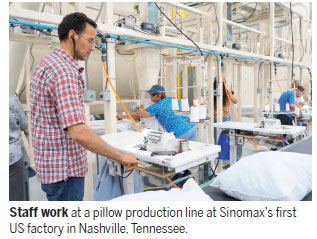
GD Copper, the largest copper tube maker in China, established a plant in Wilcox County, Alabama, in 2013, reducing the local unemployment rate by 2 percent. The company hired 350 American employees and is planning to add more.
"We use a lot of local suppliers, most of whom come from Alabama," said K. C. Pang, director of human resources and corporate affairs. "We spent more than $2 million on our packaging supplierswho are all from Alabama. We also buy oil from an Alabama company, which is more than $1million every year."
In welcoming Shandong Sun Paper's $1.3 billion investment in 2015, Arkansas Governor Asa Hutchinson said, "I not only think about the 250 direct jobs, but also the log haulers, those in the fields and the timber industry that will benefit from this extraordinary project and investment."
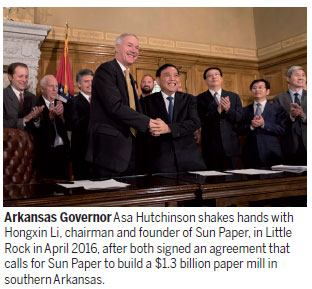
Hutchinson is just one of the many US governors, mayors and other officials who have been making unprecedented frequent trips to China in recent years to attract new investors. They all have witnessed the potential of Chinese investment to create jobs and rejuvenate their local economies.
Michigan Governor Rick Snyder is one of the most active advocates among his US counterparts. He has led seven trade trips to China since taking office in 2011, and his visits have attracted many Chinese companies to Michigan.
Other than greenfield projects creating new jobs, mergers and acquisitions have helped rescue jobs by turning around bankrupt or stressed companies.
When the US economy hit a downturn in 2008, a good number of American auto parts manufacturers, on the edge of bankruptcy, turned to Wanxiang America for help. The company is the US subsidiary of China's leading auto parts company.
According to Pin Ni, the company's president, 3,500 jobs were saved during the process. Now one in every two vehicles made in the US is equipped with auto parts manufactured at Wanxiang's various American plants.
In many cases, acquisitions also have led to expansions. For instance, Nexteer in Michigan, acquired by AVIC in 2010, soon increased its employment to more than 10,000 from the original 6,000; Virginia-based Smithfield Foods, bought by Shuanghui in 2013, added 1,500 workers within a couple of years.
A boost for US exports
For many US companies, investment from Chinese companies means gaining access to China's huge market. They now can export or increase their "Made in USA" products and services to China.
S&S AgriSource, a Chinese-owned company, has been growing alfalfa in Idaho. Its products now count for 18 percent of all Chinese alfalfa imports every year.
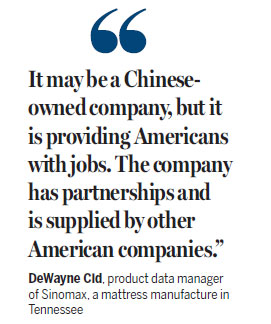
Wanxiang America bought A123 Systems in 2013, an electric car-battery manufacturer that supplied Fisker Automotive, which aspired to become a challenger to Tesla. A123 filed for bankruptcy in 2012. After a little more than a year after the Wanxiang acquisition, A123 started to generate positive cash flow. Now about 70 percent of its output is sold to China.
Many of the parent Chinese companies have a global presence, so their US-based subsidiaries not only can export products to China, but to many other countries as well.
"Paslin wants to expand globally, especially in China and Asia. Having a Chinese owner and partner can be an advantage for us," said Kirk Goins, then CEO of Paslin, after it was acquired by China's Wanfeng Auto in 2016.
Contributors to American innovation
In the past decade, with China developing into the world's second-largest economy, and due to the nature of new technologies that shrink the gap between developed and developing countries, China is catching up rapidly in the high-tech sector and gradually becoming a leader in innovation.
Mirroring this development, many of the Chinese companies no longer are content to be market followers, resting on the lower end of the economic chain. Instead, they have become active players in the high-tech sector, spending significant capital in research and development, and aspire to be frontrunners in innovation and competition.
Chinese internet giants such as Alibaba (the largest e-commerce platform in China), Tencent (owner of China's most popular messaging tools, whose market capitalization once topped Facebook's), Baidu (China's leading search engine) and NetEase (the major Chinese web portal and leading mobile-games developer) have poured resources into Silicon Valley in California, trying to gain a foothold in the hot field of cloud computing, artificial intelligence (AI)and autonomous cars.
They are now operating in the US, shoulder to shoulder with American companies, assuming their role as contributors to American innovation and competitiveness.
Tencent is the top Chinese investor in Silicon Valley, spending over $3.5 billion in more than 40 startups since 2011, plus acquiring shares in established high-tech companies such as Telsa and Snapchat. It opened its first data center in April 2017 there, expanding cloud-computing services into the US.
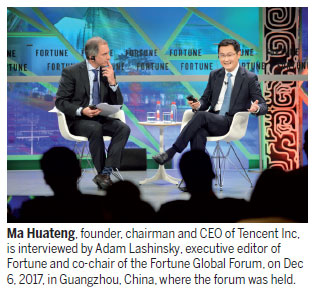
Resource from Chinese companies also helped to fund new American startups, which they usually are lacking. With this financial backing, they can prosper There area good number of Chinese-owned incubators in Silicon Valley to serve this need.
Shanghai Lingang, the largest industrialpark developer in Shanghai, bought an office building in downtown San Francisco in 2016. The incubation center has since helped more than 60 US companies to land in the Shanghaiindustrial park.
Some Chinese companies also brought their new technologies, invented in China, to the US to compete in industries such as infrastructure and transportation.
China Railway Rolling Stock Corp (CRRC), responsible for developing China's world-renowned high-speed trains, opened a new plants in Boston. It has since secured big contracts from Boston, Chicago and Philadelphia, aspiring to upgrade these cities' subway system.
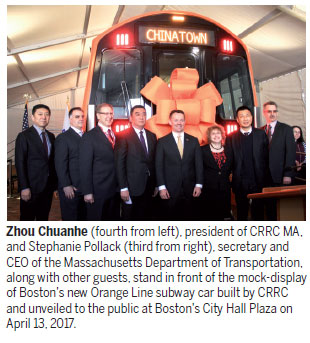
Indispensable members of local communities
Chinese companies have become tightly woven into American society, especially as participants in local communities.
Many Chinese companies are actively participating in local events and making donations to nonprofit organizations. PetroChina, China's biggest oil and gas producer with US headquarters in Houston has prided itself on its involvement in local affairs,including participating in a dragon boat contest;a livestock show and rodeo;the annual Bayou Run, a tradition in Houston for 40 years; and a local church's program to make peanut butter for homeless people. The team made more than 6,300 jars of peanut butter in more than four hours, a record for the church.
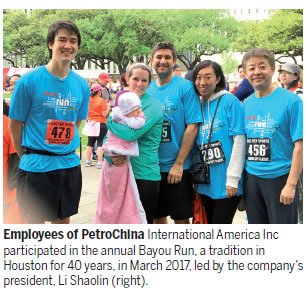
A majority of Chinese companies reinvest their capital gains in the US to buoy the American economy. The president of Wanxiang America, Pin Ni, said, "Our chairman had a commitment to make sure every penny we make in the United States is going to be reinvested in the United States. This is so we can build Wanxiang as a global company [and also demonstrate]our commitment to the local community."
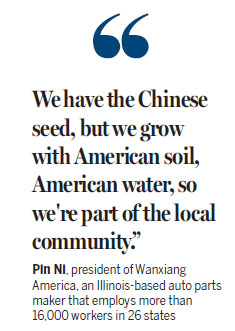
He regards Wanxiang as a local company, "We have the Chinese seed, but we grow with American soil, American water, so we're part of the local community."
Seeing the involvement of Chinese investments, US governors and mayors have embraced these companies.
"It is a tribute to Hardy Shao (the company's president) and his staff that they integrated themselves into the community and have become good community partners," said the mayor of Beatrice, Nebraska, where lawn mower manufacturer Worldlawn is based. The mayor spoke at the company's opening ceremony for its expansion in June 2017.
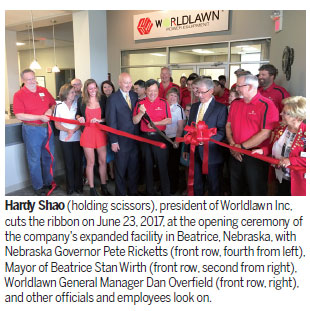
In return, Shao expressed gratitude for being embraced by the local community, "This is a beautiful and very good community. I have been welcomed by the people here. We really have a dedicated team of employees here who genuinely want this company to succeed. When I come into the office, I really enjoy being here every day."
Chinese parent company and US subsidiary in synergy
Investment from China has often led to positive financial results for parent Chinese companies and their US subsidiaries. This is particularly true in M&A deals, where the two sides complement each other when it comes to production,market access and professional growth for employees.
Wanfeng, China's largest aluminum alloy wheel producer, purchased Paslin, the world's leading welding robot application systems for the auto industry. Paslin was founded in 1937 in Warren, Michigan. Kerry Hammer, current CEO of Paslin, noted the benefits from the acquisition.
"When we are busy, we get support from Wanfeng, and when our business slows down, we'll be able to use our resources to support Wanfeng in China, which will allow us to keep employment steady. China's rich resources are able to support us, so more Americans can work," Hammer said.
In 2017, Volvo, the carmarker known for its premium vehicles, unveiled a new joint-venture technology company with Geely, its parent company, to share existing and future technology to provide economies of scale that will allow both to more rapidly develop new technology.
"This planned collaboration will strengthen Volvo's ability to develop next-generation electrified cars," said Hakan Samuelsson,president and CEO of Volvo, which was echoed by Geely's founder and chairman, Li Shufu. "We will unlock significant benefits across our portfolio by sharing both technologies and next-generation vehicle architectures," he said.
Often such synergy has been achieved through the autonomy of a US subsidiary and its Chinese parent company's financial support.
JSTI, an engineering consulting company with a focus on infrastructure, acquired TestAmerica Laboratories, the leading environmental testing company in the US.
"We plan to only control TestAmerica strategically. We trust our professional managers, and we'll leave the operational decisions to them. They will decide, for instance, the quantitative objectives for the next three or five years," said Eric Zhu, vice-president of JSTI Group.
Although it keeps TestAmerica independent,JSTI is actively working to help create a version of TestAmerica in China, because as Zhu put it, "We foresee a burst of growth before long in the environmental testing industry in China," which JSTI will benefit from with the help of TestAmerica.
This type of synergy has been magnified by Alibaba, China's e-commerce giant whose Singles Day sales total surpassed Thanksgiving's Black Friday and Cyber Monday sales in the US in 2017.
Jack Ma, the company's founder and executive chairman, promised to US President Donald Trump that Alibaba will help create 1 million US jobs. In June 2017, the company held Gateway '17 in Detroit. More than 3,000 small- and medium-sized US businesses attended the event to learn how to sell their products in China through Alibaba's platform.
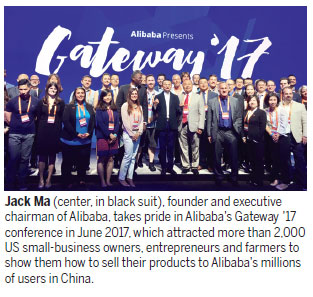
Alibaba may create synergy on a much larger scale by bringing together American companies and Chinese consumers, which would continue a trend in industry that has been beneficial to both nations.
Liyang Paper Products Co., ltd is a factory and trade company located in Dongguan, China. Specialized in producing gift paper packaging, such as Gift Box ,Paper Box, Paper Bag, Book Printing, Notebook , Folder , jewelry boxes, paper tags, jewelry tags, Sticker , Envelope , etc.
Custom made base on your design is welcome, feel free to contact Liyang printing with your full details.
www.dgliyang.en.alibaba.com │ www.ly1999.com │ www.liyangprinting.com
Liyang Paper Products Co., Ltd. was established in 1999,a professional enterprise integrated in R&D,Marketing and Manufacturing.Liyang Printing provide best solutions and service to various fields of industry.For example,we can make nice and luxury envelope.Such as Paper Envelope,envelope,coloring envelope.small envelope,etc.Our envelope with high quality are exquisite printing for your products.
We are committed to offering packaging solutions to help customers improve sales volume.
Any inquiries on our envelope,welcome to contact us at any time.
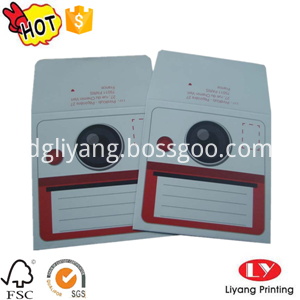
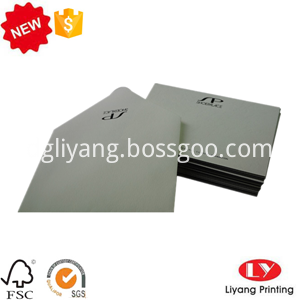
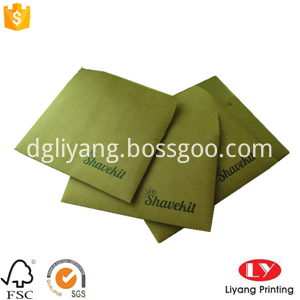
Envelope
Wedding Envelope,Cardboard Envelope,Black Envelope,Mailing Envelope,Red Envelope,Gift Envelope
Liyang Paper Products Co., Ltd. , http://www.liyangprinting.com